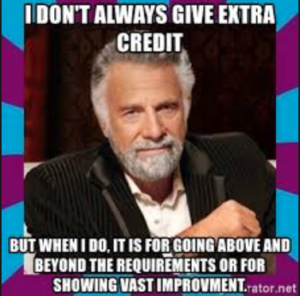I think a lot about grades in my classroom. If you’re a teacher, you probably do too.
Does this grade accurately reflect what my student has learned? What should I be grading? Do we put too much emphasis on grades? Should we even have grades?
Each of those questions are important to ask, and they all have tough answers. I’ll avoid “answering” them here, but I do want to share some thoughts I have that could help you re-think grading in your classroom:
- Watch your language when talking about grades with your kids. Kids are very perceptive & pick up on the words you use & the meanings they have.
- The best “grading” or “assessment” happens when you’re moving around the room, listening to kids describe how they’re learning or not learning, what they’re struggling with or confident with. Get out from behind your teacher’s desk (if you still have one) and go sit in the “student” desks.
- Success and failure are both important. Success is how we know we’ve “mastered” something. Failure is how we learn something about ourselves, whether we’re willing to persevere or be content as a quitter.
- Extra Credit is usually used as some sort of “project” to help kids “get their grade up.” That seems backwards. Extra implies that its an assignment to push the kids to the next level, not just to make up for never doing the basic level.
- I love data (I’m a math teacher) but data only gives a small bit of the picture. A beautiful photograph of a stained glass window can contain 14 colors and 12 different shapes, but that tells me nothing about the actual window.
What are some things we could do differently in our classroom?
- When a kid mentions something like “are we getting graded on this” or “what do I have to do on this to get a good grade,” answer with “we’re not here to get grades, we’re here to learn.”
- Take some of your Extra Credit assignments and turn them into the “regular” assignments. There’s a good chance that many of these assignments are engaging and filled with opportunities for making and creativity.
- Don’t talk about kids in terms of their grades. Instead of saying a particular student is an “A Student” or a “D Student” say “this kid is hard working” or “this kid is so creative” or “this kid is starting to turn it around.” You wouldn’t want your principal saying you’re a “C Teacher,” would you?
- When you do give kids a grade, remember that it’s just an approximation of what they can recall or perform or produce on that particular day in that particular situation. Try to find ways to make grades reflect consistent effort as well as recall & comprehension & ability to use what they’ve learned.
Do you have more ideas for using grades as something good, or ways to make grades more reflective of your students’ abilities or efforts? Share them with me on Twitter @dailystem
